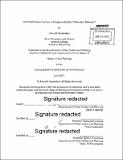Do private water tankers in Bangalore exhibit "mafia-like" behavior?
Author(s)
Rajashekar, Anirudh V
DownloadFull printable version (11.30Mb)
Other Contributors
Massachusetts Institute of Technology. Department of Urban Studies and Planning.
Advisor
Bishwapriya Sanyal.
Terms of use
Metadata
Show full item recordAbstract
While there is an increasing acceptance in academic literature about the importance of informal water delivery in cities around the developing world, public opinion is often divided. Many citizens see informal water vendors as businesses controlled by extortionary "mafias" and call for government regulation. This thesis explores whether government regulation is justified in the case of Bangalore, India where water issues have become increasingly pressing and informal water vendors, also known as the "water mafia," have grown in number and in influence. In particular, this thesis will explore whether private tankers display any form of anti-competitive behavior by addressing two questions: 1) Do private water tankers exhibit monopoly power, and 2) Do private water tanker prices vary depending on the characteristics of the customers they serve? Evidence collected in July-August 2014 and January 2015 indicates that tankers do not operate in an anti-competitive manner and that government intervention is not justified on these grounds. However, tankers do contribute to declining groundwater levels and government intervention on these grounds ought to be explored.
Description
Thesis: M.C.P., Massachusetts Institute of Technology, Department of Urban Studies and Planning, 2015. "June 2015." Cataloged from PDF version of thesis. Includes bibliographical references (pages 99-104).
Date issued
2015Department
Massachusetts Institute of Technology. Department of Urban Studies and PlanningPublisher
Massachusetts Institute of Technology
Keywords
Urban Studies and Planning.